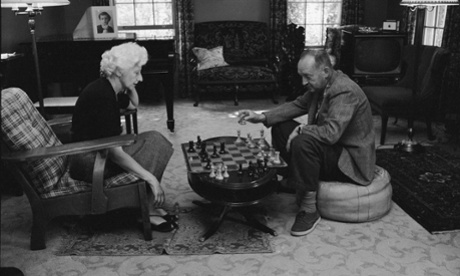
“I have an 11-year-old son – of course I play Minecraft,” JK Rowling tweeted on Monday, after counting the world-conquering world-building online game as one of her distractions from writing, along with books for research and 24-hour news. There’s a long tradition of other authors turning to a variety of such games – mostly as light relief from their vocation, but also sometimes finding writerly inspiration.
Here are just a few other famous literary gamers. Do add further examples below.
Chess – Vladimir Nabokov
The Russian grandmaster of prose played chess regularly with his wife Véra, but is not said to have been such a brilliant player. However, his 1971 book Poems and Problems counts as something of a literary one-off, including 18 signature problems alongside the verse. Chess featured prominently in some of his fiction, too: The Defence follows Aleksandr Ivanovich Luzhin, a troubled and introverted boy who takes up chess and quickly rises to grandmaster. He is unable to beat the Italian ace Turati, however, triggering thoughts that his life is a strange sort of chess game, noticing the repetition of “moves” and “plays” in everyday existence. He soon realises that he must leave the game – climbing out a window and falling to his death. Nabokov’s Luzhin suffered checkmate in the most fundamental sense: a fatal existential confusion of life and games.
Nabokov wrote of the game: “Chess problems demand from the composer the same virtues that characterise all worthwhile art: originality, invention, conciseness, harmony, complexity and splendid insincerity.”
Snooker - AS Byatt
It’s perhaps not quite so intimately bound up with her art, but AS Byatt has long been an avid fan of snooker. Part of this is for purely aesthetic reasons – she admires “the movement of round balls, and the shifting lines of force and energy made by the players’ movements”. The other central attraction is the dramatic tension embedded in the game: “There is a story, and the end is really unknown until it comes.” The passion has yet to show itself in her fiction, but who knows if there will be some pivotal tricky kisses in future.
Darts - Martin Amis
Martin Amis made aspiring darts professional and petty criminal Keith Talent the star of his 1989 novel London Fields. In his creation of Keith, Amis is reported to have been inspired by Keith Deller, who won his only world darts title at the precocious age of 23 in 1983. Amis later interviewed Deller for the Observer some five years after his astounding victory – which he was unable to repeat - writing that “There is no cave deeper or darker than darts.”
Table tennis - Howard Jacobson
“The return of social table tennis feels like a reversion to an earlier time,” Booker winner Howard Jacobson has written. His 1999 novel The Mighty Walzer depicts the 1950s Jewish Manchester that Jacobson grew up in, and draws heavily on his own prowess as a junior table-tennis champion. Jacobson used to play with leather-bound classic books to practise his table-tennis technique when growing up: “I think I played with Wuthering Heights, probably, and then I thought I’d be even better when it came to playing with a bat.”
Video games – Naomi Alderman
The author of Disobedience and The Liar’s Gospel writes a gaming column for the Guardian. In one of her columns, she writes that gaming can influence players’ whole outlook on life: “If all the world’s a game, it’s more playful and more goal-oriented, less important but more filled with personal meaning. Now, where’s the Shakespeare of game-making to write about it?” Does she have that ambition herself? She authors games, and was the lead writer on Zombies, Run! She hasn’t yet written literary fiction about them, but has said in interviews that her knowledge of how games work has been helpful when composing action scenes.
Poker – Al Alvarez
For poet Alavarez – also a famously authoritative poetry editor of the Observer in the 50s and 60s – poker is rather more than recreation. Poetry is not really a way to make living, but if you’re good – and Alvarez is a demon player – poker is. He’s written a number of books about the game, to most acclaim in The Biggest Game in Town. But he has also made a good living turning the cards himself, a formidable enough player to state that the game is only gambling if you’re a poor player.
First-person shooters – Alex Garland
The novelist, screenwriter and film director is a big fan of the first-person shooter video game BioShock, loosely based on Ayn Rand’ self-interest-championing philosophy of objectivism as outlined in her novels Atlas Shrugged and The Fountainhead. As he told Edge, “The imagery was really stunning and the set-up was really pure and simple, and there were all these unexpected things … It presented you with moral choices that you had to make that felt like really ethical decisions”.

